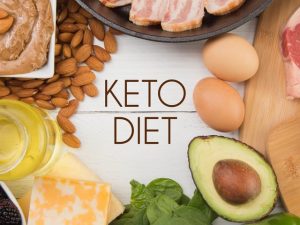The Ketogenic Diet, What You Need to Know.
The ‘Keto’ diet. It’s getting a lot of press! And you very likely know someone who is on it or who has tried it.
It actually is becoming quite vogue with those seeking weight-loss and its health benefits.
 What is it? Keto, short for ketogenic, is a diet that is very low in carbs and very high in fat with a moderate amount of protein.
What is it? Keto, short for ketogenic, is a diet that is very low in carbs and very high in fat with a moderate amount of protein.
It’s enjoying its time in the spotlight due to the success some people have had losing weight by following the plan.
Even with the high fat??
For some people, Yes!
Here ‘s how reprogramming your metabolism causes ketosis, and what to keep in mind if considering it for yourself.
First: What exactly IS ketosis?
Your brain and muscles rely on carbs for fuel. Sugar and starch, (which turns to sugar in your body), are the preferred source of energy to keep your brain and body functioning. This is why when you get hungry, you may have trouble concentrating, you can get ‘hangry’, and your energy tanks.
When you take in a very limited amount of carbs your body will use fat to make “ketones” for its source of fuel.
So, when your body is in a ketogenic state it simply means it is generating ketones, and when your body continues to make ketones because there are not enough carbs to keep your brain and body functioning these ketones build up in the blood. This is called “ketosis” You would experience the same thing after fasting for 72 hours when your supply of carbs has been depleted. That is the signal for your body to convert fat to ketones.
Note: Don’t confuse Ketosis for the dangerous condition” ketoacidosis.”
It seems counter-intuitive that a diet so high in fat can actually help with weight loss, but studies show it can work for some people. And keto can work better for weight loss than following a low-fat diet when comparing similar calorie deficits.
The reason for this is because protein and fat are very filling. And satiety is one key component to not overeating. Rather than tracking calories in order to know when to stop eating (whether or not you are still hungry); limiting carbs, and focusing on fat and protein for your preferred intake, you may actually eat less because you feel fuller faster. This way you eat less food in the long run and that is what leads to weight loss.
I mentioned earlier other health benefits of a ketogenic diet.
As you may have guessed, very low intake of carbs can help reduce blood sugar levels and insulin problems. In fact, some studies showed lower blood sugar levels when following a ketogenic diet and 75% improvement in insulin sensitivity. Another showed improved cholesterol, and triglyceride profiles.
And children with seizure disorders are being helped by following a ketogenic diet.
As you can see, a ketogenic diet can have numerous health benefits.
But it is not for everyone.
It is a very restrictive way of eating and therefore it can be very difficult to maintain. And going ‘off’ the keto diet after following it, often leads to weight gain, sometimes even more weight than was lost.
Side effects, such as the ‘keto flu’ including nausea, vomiting, constipation, diarrhea, headache, muscle cramps, and difficulty sleeping among others, are often enough to discourage those who try it.
Following a ketogenic diet requires getting between 60 and 75% of calories from fats, 20-35% of calories from protein while only 5% of calories are to come from carbs.
The main foods ‘allowed’ on a keto diet are meat, fatty fish, poultry, eggs, nuts and seeds avocados, oils and vegetables that are very low in carbs (leafy greens, peppers, cucumbers, celery etc.)
The downside:
All the foods that are off-limits; such as grains, fruit, legumes, starchy vegetables, alcohol, and most sugary desserts.
Personally, I’m not a fan of cutting out entire food groups, unless there is a medical reason to do so. Otherwise, this type of plan, by nature, is so restrictive it’s typically unrealistic as a long-term strategy. And by cutting out fruit and starchy vegetables, you miss out on so many vitamins, minerals and phytonutrients it makes it necessary to fortify your diet with supplements.
There is no denying the popularity of the ketogenic diet these days. It has been shown to help with weight loss and other health concerns. But it is not for everyone. If you want to give it a go, check with your doctor first and be sure to work closely with a qualified health practitioner to ensure you are getting adequate nutrition.
References:
https://patriciadaly.com/ketogenic-diet-contraindications/
http://www.precisionnutrition.com/ketogenic-diet
https://authoritynutrition.com/ketogenic-diet-101/
http://neurotrition.ca/blog/going-keto-what-science-saying-3-safe-ways-do-it
